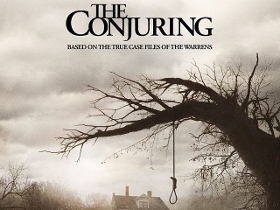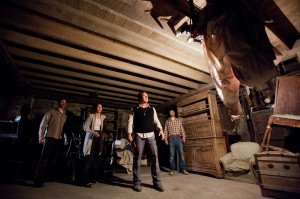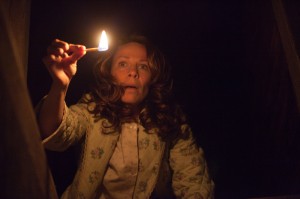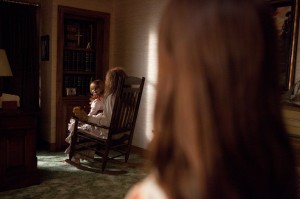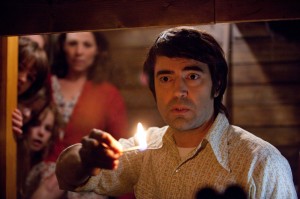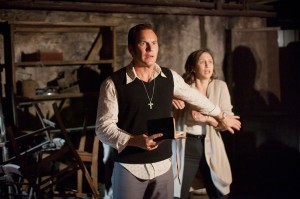OLD SCHOOL AND SCARY AS HELL
In The Conjuring, Patrick Wilson and Vera Farmiga take the roles of paranormal investigators Ed and Lorraine Warren, a Nick and Nora of supernatural troubleshooting. The real-life Warrens are best known in some circles as investigators at Amityville, but The Conjuring comes from a lesser known incident earlier in their career, a 1971 investigation at a 300-year-old Rhode Island farmhouse. The Perrons – husband, wife, and five daughters – moved in to find creaky doors, scary cellars, evil music boxes, and things that go bump in the night – at 3:07 a.m. every night, to be exact.
The thing that will scare the wits out of you is the “hide-and-clap game” seen in this taut thriller: One child puts on a blindfold. The other children run and hide. A clap from the seeker must be answered by a clap from the hiders. Think of Marco Polo, only on dry land. It looks like a fun family game. After The Conjuring, no family will ever play it again.
The horror of two hands clapping is the perfect example for the film’s powerful, terrifying minimalism. Many films labeled minimalist feel limited by their circumstances. This one feels liberated from present-day horror film conventions. Rather than build on gore or effects, the film is built on small, familiar things and contains some of the most patient scenes you will ever see. Much has been celebrated about the action film moving back to basics. When coupled with his previous release Insidious, director James Wan seems to be leading a similar retro movement in the horror division.
One of the small geniuses of The Conjuring is the fact that it feels “made then.” Rather than update, Wan’s smartest decision is to shoot period and go for verisimilitude. The digital cinematography of John R. Leonetti feels like era-driven film stock, due to the lighting’s influence. What’s really frightening resides in Julie Berghoff’s skillful production design, which includes a fantastic built-from-scratch replica house.
Words accumulating around this period style are “old-fashioned,” “old-school,” “classical.” There are few originalities in the film, but that seems like an effective part of the exercise. There’s little foul language, and the feeling of childhood innocence is so thick that the children could start singing. It could be a Disney film, except for the part where it will send the kiddies home with nightmares.
I happened to see The Exorcist earlier this year. What struck me about the 1973 classic is its medieval tone, the suggestion that maybe we’re not as far away from the Middle Ages as we like to think. The film doesn’t just scare; it provides an accounting of the way we live. While enormously effective, that extra level is missing. We’ll have to settle for what The Conjuring is – an innocent throwback fright-fest.
photos courtesy of Warner Bros.
The Conjuring
New Line Cinema, Warner Bros. Pictures
rated R
in wide release July 19, 2013
